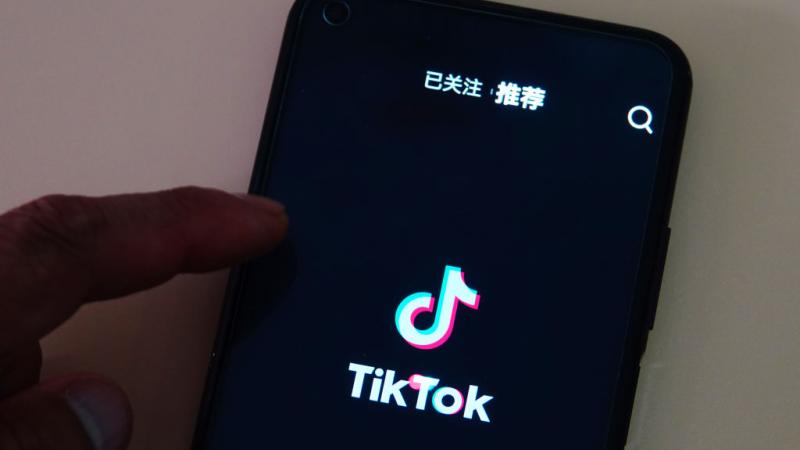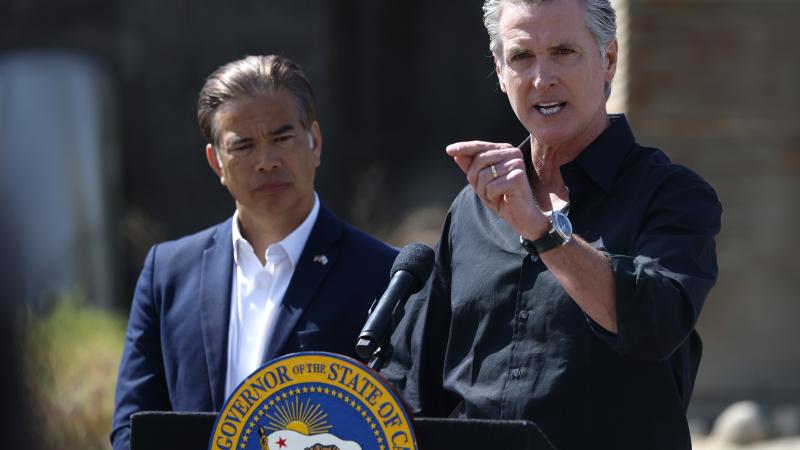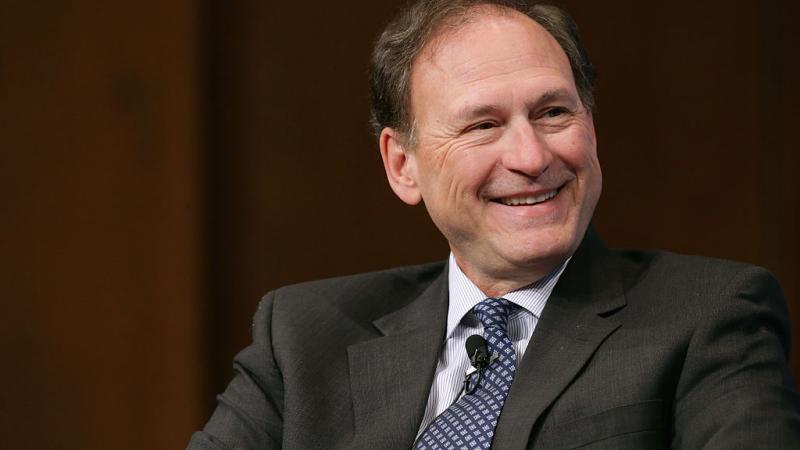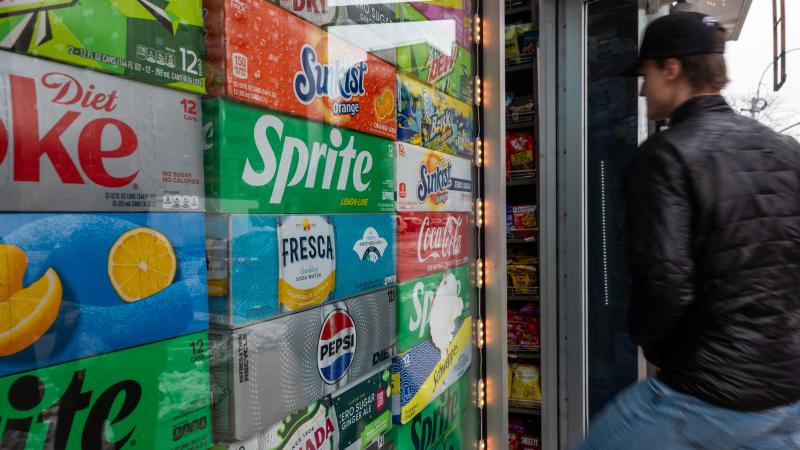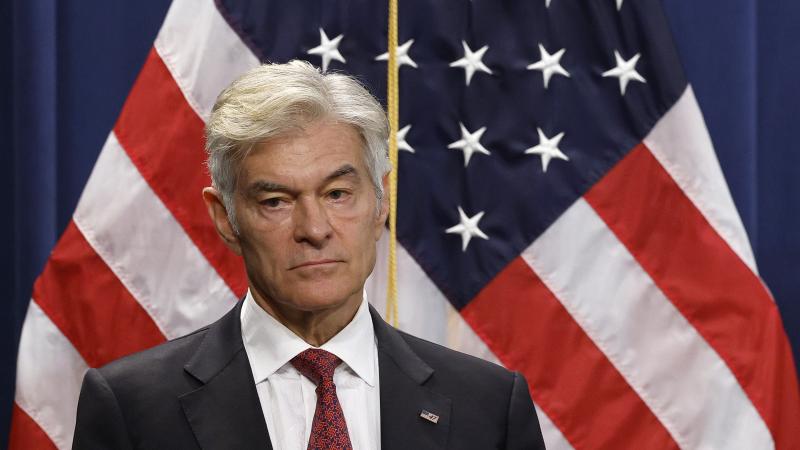As Trump ramps up tariffs, TikTok boosts pro-China trade content
A new study shows the social media app appears to be a vector for Chinese propaganda aimed at undercutting Trump’s trade war. The company was given an extension of time to complete a sale, but its owner, ByteDance, said that any agreement will be subject to approval under Chinese law.
President Donald Trump’s effort to save popular social media app TikTok has been caught in the escalating tariff war between Washington and Beijing, with Trump suggesting that he may again extend the deadline for a deal.
A new study concludes that, at the same time as China is using the application as a negotiating chip, the platform is boosting propaganda aimed at undermining U.S. support for Trump’s tariff policies and to promote Chinese goods and manufacturers.
The Network Contagion Research Institute (NCRI), a strategy firm specializing in internet communications analysis, conducted and published the study, and previously found that TikTok suppressed "anti-China" content and successfully influenced users' opinion on the communist country’s human rights record and control of society. TikTok likely manipulated its proprietary algorithm, in line with long-running congressional concerns about the app, Just the News reported earlier this year.
Tariffs met with surge of pro-China postings
Just after President Trump last month announced a significant escalation in his tariff trade war with China—a 145% tariff on all Chinese goods—TikTok users observed a seemingly grassroots surge of Chinese influencers posting about affordable Chinese goods and greedy practices of American luxury brands. The posters urged Americans to “cut out the middleman” and buy directly from sources in China instead, undercutting the Trump tariffs.
In one video, since removed from the platform, TikTok user Wang Sen claimed 80% of luxury handbags are made in China at a much cheaper price than companies charge Americans. “[You] have been misled and poisoned by the marketing campaign of those luxury brands for too long,” the poster said, according to Forbes.
Several luxury goods companies pushed back on the messaging. For example, luxury exercise clothing manufacturer Lululemon urged its buyers to beware of “counterfeit products and misinformation” related to the campaign, a company spokesperson said in a statement.
The new NCRI study concluded this surge in “sourcing” content out of China was far from spontaneous. In fact, the researchers concluded that the content directly aimed at undermining U.S. tariff policy coincided with a Chinese government campaign to promote “Shopping in China” and was tied to influencers linked to Chinese big tech companies aligned with the communist country’s propaganda and intelligence apparatuses.
TikTok surge mirrors CCP-backed campaign with a hashtag
Beginning on April 10, just days after President Trump announced significant tariffs on China, TikTok was flooded with content bearing the “#sourcing” hashtag, in which Chinese influencers encouraged Americans to purchase products directly from Chinese manufacturers and criticized Western companies for buying cheap goods from China and marking up prices for unsuspecting Americans, the research showed.
Only three days later, the Chinese Ministry of Commerce announced that it was launching a “Shopping in China” initiative for domestic and foreign consumers, who are encouraged “to visit China, purchase premium Chinese goods, savor Chinese culinary delights, and admire China’s natural and cultural wonders, collectively experiencing the unique appeal of ‘Shopping in China.’”
The researchers also noted that, following the surge on TikTok, the online English-version of the Chinese Communist Party’s official newspaper, People’s Daily, covered the "consumption promotion campaign,” signaling the party’s approval or hand in the effort.
NCRI conducted an experiment using accounts designed to simulate the user experience of a U.S.-based 22-year-old to determine the “stickiness” of pro-China sourcing content. In this case, stickiness refers to how well the algorithm encourages certain content to appear, or stick, to new user accounts that show interest or engagement in the topic.
Using a control group focused on professional ice hockey content and one group focused on sourcing content, the researchers found that TikTok’s algorithm significantly boosted the sourcing content on its recommended page.
“In the NHL control journey, only 5 out of 120 FYP videos (4.2%) reflected hockey content, despite real-world surges in interest around the Stanley Cup Playoffs,” the researchers concluded. “In contrast, all 9 sourcing-focused journeys exceeded 10% sourcing-related content penetration, with 5 reaching or exceeding 20% saturation (at least 24 out of 120 FYP videos).” FYP is TikTok parlance for a personalized "For You Page" that is crafted to appeal to that specific user's interests and purchase history through the app.
Sending signals and exploiting algorithms
Researchers also tested the same scenario on YouTube, owned by U.S.-based Google, a subsidiary of Alphabet Inc., and found that the opposite was true: there, China-sourced content received no special treatment and, in fact, underperformed ice hockey content compared to TikTok.
“These findings suggest that TikTok’s algorithm exhibits a pronounced sensitivity to #sourcing engagement signals, amplifying this category at rates notably higher than for naturally trending, non-politicized interest categories like professional sports,” the report reads.
The researchers also found that several of the largest Chinese influencers—the originators of some of the pro-sourcing content—had ties to some of China’s largest technology companies, which are often under state pressure to conform to communist party policy.
You can read the study below:
"The Chinese Communist Party is leveraging TikTok to combat President Trump's trade policy,” Michael Sobolik, a Senior Fellow at the Hudson Institute and author of Countering China’s Great Game: A Strategy for American Dominance, told Just the News.
“The ByteDance-controlled algorithm is boosting content from Chinese manufacturers that encourages U.S. users to purchase goods directly from China via apps like Alibaba and DHgate. These videos have garnered over 50 million views on TikTok,” Sobolik continued.
“They serve a broader objective for Xi Jinping: turn Americans against their own elected officials. If Trump is serious about winning this trade war, he should comply with the law Congress passed last year and take TikTok offline immediately,” he said.
In the meantime, President Trump is working to secure a deal to save the popular video sharing platform from facing a permanent ban, swimming against the current created by a bipartisan congressional coalition that has long warned of security and privacy issues as well as its parent company’s close relationship with the Chinese Communist Party. Under a law passed by Congress, TikTok, owned by China-based ByteDance, will be blocked if the Chinese parent company fails to divest itself of the asset.
President Trump, who originally proposed a ban on the application in 2020, has since reversed his position, crediting the platform with helping him win a greater percentage of the youth vote in the 2024 presidential election after his campaign opened an account. This experience engendered in him a “sweet spot” for the app, Trump reiterated in an interview with NBC’s Kristin Welker, which aired Sunday.
In that interview, Trump also suggested that he would extend the deadline for a sale for the third time, a move which critics say is illegal under the framework passed by Congress, which only provides for a single, 90-day extension while a sale is negotiated.
“Let me ask you about TikTok, sir, would you extend that deadline if there’s still no deal?” NBC’s Kristin Welker asked the president.
“I would,” Trump replied, reiterating that he would “like to see” a settlement.
Beijing covets TikTok and its algorithm
Beijing has also signaled that it will seek to block any sale of the app while it is embroiled in the trade war with Washington. China reportedly soured on a deal in early April to transfer control of the application to U.S. investors after Trump imposed the substantial tariffs, the president said previously.
“We had a deal pretty much for TikTok — not a deal but pretty close — and then China changed the deal because of tariffs,” Trump told reporters aboard Air Force One last month. “If I gave a little cut in tariffs they would have approved that deal in 15 minutes, which shows the power of tariffs.”
This deal, which had the approval of ByteDance before the tariffs, foresaw the U.S. government and investors transferring TikTok’s U.S.-based operations to a new company majority owned by American investors. After the tariffs were announced, the Chinese government reportedly signaled that it would scuttle any deal, Reuters reported.
This latest study adds to a growing body of evidence that China views TikTok as more than just a bargaining chip in a trade war, but rather a powerful tool to influence American public opinion.
Quashing online critique Chinese-style
Earlier NCRI data published by Just the News in January shows content critical of China and its government was suppressed when compared to similar searches on Instagram and YouTube. The apparent suppression of results, the researchers argued, is evidence that the platform’s search results are purposefully biased.
The researchers also sought to understand whether TikTok use actually changed public perception of the Chinese government and Communist Party, represented by user attitudes towards its human rights record and favorability towards China as a travel destination. The researchers conducted a social media user-representative survey of 1,214 U.S. adult participants to measure social media use and their rating of China’s human rights record and favorability as a travel destination.
The data showed a significant positive correlation between time spent on TikTok and giving China a higher human rights rating. Researchers also found a similar pattern for respondents favoring China as a travel destination.
The Facts Inside Our Reporter's Notebook
Documents
Links
- Network Contagion Research Institute
- previously found
- a seemingly grassroots surge
- the poster said
- targeting foreign consumers
- consumption promotion campaign
- Senior Fellow at the Hudson Institute
- warned of security and privacy issues
- close relationship with the Chinese Communist Party
- in an interview
- crediting the platform
- Trump told reporters
- would have transferred TikTok
- found the popular Chinese-owned platform was suppressing anti-China content


